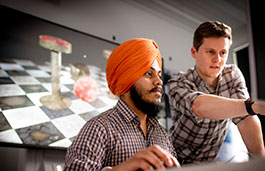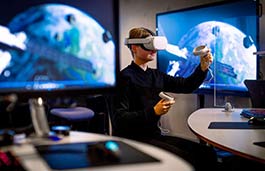Search
Games Technology MSci/BSc (Hons)
Study level: Undergraduate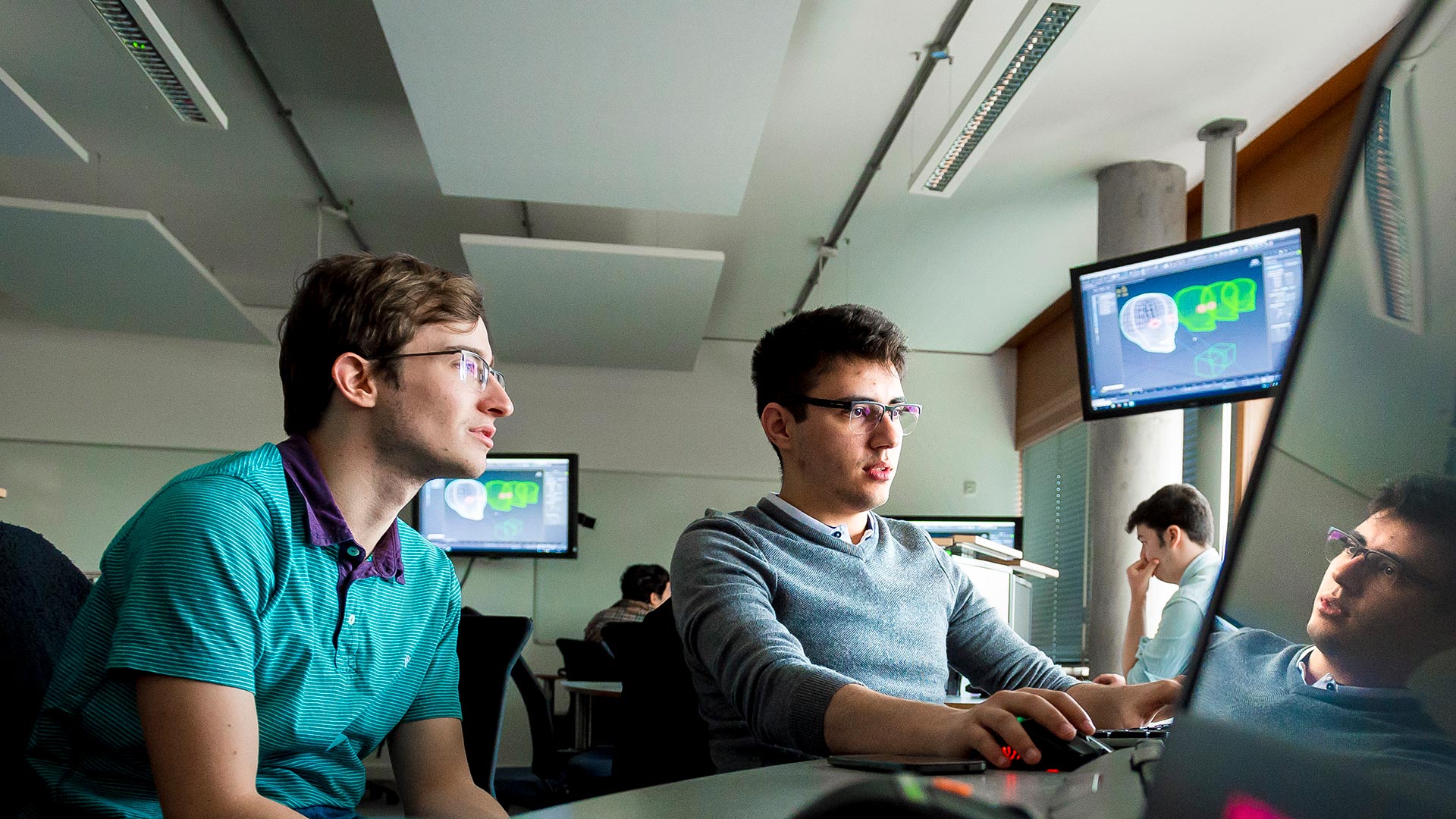
Coventry University’s Games Technology degree is a highly-focused software engineering course with a long history of training specialist programmers and developers for the video games industry world-wide.
Course option
Year of entry
Location
Coventry University (Coventry)
Study mode
Full-time
Sandwich
Duration
BSc:3 years full-time4 years sandwich
MSci:4 years full-time5 years sandwich
UCAS codes
G454 / G455
Start date
September 2024
Course overview
The course doesn’t only teach you how to use game engines – it teaches you the programming and scientific skills necessary to extend commercial engines and develop your own from scratch.
These are the skills industry looks for in game programmers.
- Master advanced techniques to leverage and extend industry-standard engines in the creation of immersive, interactive experiences.
- Understand the engineering and technology which underpins digital artwork and real-time rendered animations.
- Develop your own game engine systems, from graphics renderers to physics libraries, using high-performance programming techniques.
Rated Gold Overall
Teaching Excellence Framework (TEF) 20235 QS Stars for Teaching and Facilities
QS Stars University RatingsTop 5 Student City in England (Coventry)
QS Best Student Cities Index 2025Why you should study this course
- The technology, practices and challenges involved in game development are continually evolving, therefore the course content reacts dynamically to reflect the complexities of this modern and increasingly interconnected sector.
- The course aims to empower you with the fundamental capabilities needed to pursue independent game development, as well as giving you the opportunity to gain professional tools and wider contextual understanding of game engineering upon successful completion, to succeed in larger studios.
- Develop your own games and game technologies in our dedicated Game Development Laboratories4.
- Explore emerging technologies with virtual and augmented reality hardware.
- Gain experience with console and cross-platform development.
What you'll study
We regularly review our course content, to make it relevant and current for the benefit of our students. For these reasons, course modules may be updated.
How you'll learn
A portion of your contact time will be dedicated to course support sessions. The course support sessions are weekly, timetabled sessions where you can explore areas of the course which you may find challenging or get support with personal projects and employability efforts.
Teaching contact hours
We understand that everyone learns differently, so each of our courses will consist of structured teaching sessions, which can include:
- On campus lectures, seminars and workshops
- Group work
- Self-directed learning
- Work placement opportunities2.
If you would like more information, you can request information about teaching hours.
Part of university life is undertaking self-directed learning. During a typical week you will have time that allows you to work independently to apply the skills and knowledge you have learnt in taught or facilitated sessions to your projects or assignment briefs. This self-directed learning allows you to use your research skills, consolidate your knowledge or undertake collaborative group work.
As an innovative and enterprising institution, the university may seek to utilise emerging technologies within the student experience. For all courses (whether on-campus, blended, or distance learning), the university may deliver certain contact hours and assessments via online technologies and methods.
Since COVID-19, we have delivered our courses in a variety of forms, in line with public authority guidance, decisions, or orders and we will continue to adapt our delivery as appropriate. Whether on campus or online, our key priority is staff and student safety.
Assessment
This course will be assessed using a variety of methods which will vary depending upon the module.
Assessment methods may include:
- Formal examinations
- Phase tests
- Essays
- Group work
- Presentations
- Reports
- Projects
- Coursework
- Exams
- Individual assignments
The Coventry University Group assessment strategy ensures that our courses are fairly assessed and allows us to monitor student progression towards achieving the intended learning outcomes.
International experience opportunities
Computer game development is considered an international business. Most of the technical subjects you could learn are applicable worldwide and, where they exist, significant regional or country-specific differences are highlighted. For example, the emphasis for different colours in different cultures, such as white being associated with death in Japan.
If you have a desire to travel it is possible to study abroad for a year at universities around the world2. Collaborative Online International Learning (COIL) projects means you may also have the opportunity to work on projects with students in universities which have previously included Brazil and Indonesia2.
Many of the field trips and industry visits we offer take place abroad2. In the past, for example, students have visited Indonesia where students participated in an international games jam, visited local game companies and an exciting cultural program.
Please note that all international experience opportunities may be subject to additional costs, competitive application, availability and meeting applicable visa and travel requirements are therefore not guaranteed2.
Entry requirements
Typical offer for 2024/25 entry.
Not got the required grades? We offer this degree with an integrated foundation year.
Fees and funding
2024/25 tuition fees.
| Student | Full-time | Part-time |
|---|---|---|
| UK, Ireland*, Channel Islands or Isle of Man | £9,250 per year | Not available |
| EU | £9,250 per year with EU Support Bursary** £19,850 per year without EU Support Bursary** |
Not available |
| International | £19,850 per year | Not available |
If you choose to do a work placement2, you should consider travel and living costs to cover this. There is also a tuition fee3 of £1,250 that will cover your academic support throughout your placement year.
For advice and guidance on tuition fees and student loans visit our Undergraduate Finance page and see The University’s Tuition Fee and Refund Terms and Conditions.
We offer a range of International scholarships to students all over the world. For more information, visit our International Scholarships page.
Tuition fees cover the cost of your teaching, assessments, facilities and support services. There may be additional costs not covered by this fee such as accommodation and living costs, recommended reading books, stationery, printing and re-assessments should you need them. Find out what's included in your tuition costs.
The following are additional costs not included in the tuition fees:
- Optional international field trips: £400+ per trip.
- Any costs associated with securing, attending or completing a placement (whether in the UK or abroad).
*Irish student fees
The rights of Irish residents to study in the UK are preserved under the Common Travel Area arrangement. If you are an Irish student and meet the residency criteria, you can study in England, pay the same level of tuition fees as English students and utilise the Tuition Fee Loan.
**EU Support Bursary
Following the UK's exit from the European Union, we are offering financial support to all eligible EU students who wish to study an undergraduate or a postgraduate degree with us full-time. This bursary will be used to offset the cost of your tuition fees to bring them in line with that of UK students. Students studying a degree with a foundation year with us are not eligible for the bursary.
Facilities
The School of Computing, Mathematics and Data Science is based in the Engineering and Computing Building, and the attached Beatrice Shilling Building.
Both buildings are high-specification learning environments which benefit from extensive social learning facilities, well-appointed laboratories, lecturing facilities and classrooms, facilitating our innovative teaching methods across a diverse suite of undergraduate and postgraduate courses4.
- The Game Lab
High-specification PC lab where the majority of your lectures and laboratories will be delivered. Additionally, you can access these machines outside of class to pursue development projects. - The High-Performance Lab
HPC developer-spec’d machines to encourage students to explore more advanced and demanding software engineering challenges. - Motion-Capture Studio
A bespoke facility complete with green-screen, control room and lighting rig, empowering students to explore advanced human-computer interaction and simulation technologies.
Careers and opportunities
On successful completion, you will be able to:
- Demonstrate knowledge and understanding of the underlying technology, design methods and programming languages required to practice as an IT professional.
- Appreciate the cultural, commercial, ethical, and professional issues connected with the IT industry and professional practice within it.
- Demonstrate awareness of emergent technologies and techniques in the wider computing domain, such as VR implementation techniques, pervasive computing, designing software to be engaging and usable as well as cutting edge graphics programming.
- Apply appropriate problem-solving techniques and design protocols to computing requirements or issues.
- Research the concept, design, and development of a product in the computing domain, providing relevant and useful conclusions in the evaluation of the implementation.
The course sends graduates into the games industry and related sectors every year, and where possible invites students back to give guest talks or participate in extracurricular activities.
In recent years, graduates from companies like Rare and Criterion Games have returned to support our Game Jam events.
As well as careers in the games industry, the course equips students with the technical skills needed to excel as high-performance software developers in many collaborative or independent development environments.
Where our graduates work
- Unity Technologies
- Criterion Games
- Codemasters
- Rare Ltd
- Free Radical Design Ltd
- Flix Interactive
- Digital Media Technologies
- Bosch
- Tesco PLC
- Totem Learning Ltd
Graduate Immigration Route visa
Based on current information from the UK Government, international students whose study extends beyond summer 2021 may be eligible for a visa under the UK Government’s Graduate Immigration Route, which will enable students to stay and work, or look for work, in the UK at any skill level for up to two (2) years. Check the most up to date guidance available to check your eligibility and any updates from the UK Government before making an application or enrolment decision.
How to apply
You may also like
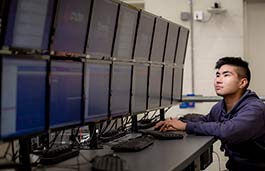
Computer Systems Engineering MEng/BEng (Hons)
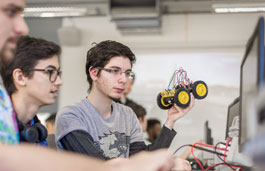
Software Engineering BSc (Hons)
